|
|
|
Sort Order |
|
|
|
Items / Page
|
|
|
|
|
|
|
| Srl | Item |
| 1 |
ID:
140574


|
|
|
|
|
| Summary/Abstract |
VICTORY! Very much like in 1945 this proud word resounded all over the world and was heard in Europe, Asia, America, and Oceania at peace marches, antiwar demonstrations and pickets, international forums and scientific conferences. Political and public figures, academics from various countries deemed it necessary to remind mankind that it had paid dearly for the right to live and that the Soviet Union which had made the greatest contribution to the rout of Hitler Germany paid an inconceivably high price for the victory.
|
|
|
|
|
|
|
|
|
|
|
|
|
|
|
|
| 2 |
ID:
140576


|
|
|
|
|
| Summary/Abstract |
I AM OFTEN ASKED to name the most memorable moment of my three decades as a U.S. diplomat managing America's relations with the Soviet Union and Russia, 1983-2013. My memories are many and vivid. I recall the bitter cold of Red Square in the winters of 1984 and 1985 when I accompanied Vice President George W. Bush to the state funerals of Soviet leaders Andropov and Chernenko. And I will never forget the unexpected warmth of the summit meetings between Reagan and Gorbachev that I helped prepare in 1988. I was deeply proud when Presidents Medvedev and Obama signed the START Treaty reducing strategic nuclear weapons, an achievement that brought immense satisfaction to all of my American and Russian colleagues who helped negotiate the agreement.
|
|
|
|
|
|
|
|
|
|
|
|
|
|
|
|
| 3 |
ID:
140599


|
|
|
| 4 |
ID:
140582
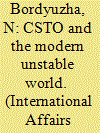

|
|
|
| 5 |
ID:
140597
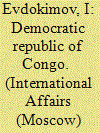

|
|
|
|
|
| Summary/Abstract |
THE YEAR 1960 has come to be known as the Year of Africa as 17 states of the Black Continent became independent that year, throwing off the chains of colonialism. Among them was the Belgian Congo, the then name of today's Democratic Republic of Congo (DR Congo), the world's most populated Francophone country and, in terms of area, the largest country in Sub-Saharan Africa. The Belgian Congo became independent on June 30, 1960. Today, June 30 is DR Congo's main national holiday.
|
|
|
|
|
|
|
|
|
|
|
|
|
|
|
|
| 6 |
ID:
140592
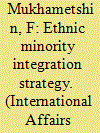

|
|
|
|
|
| Summary/Abstract |
MATTERS RELATED TO LANGUAGE use go beyond the framework of philological disciplines and in some way or other impact various aspects of public life. Language and culture are recognized within the international community as principal "soft power" tools for promoting a country's positive image abroad. In addition to various aspects of language policy in Russia, the joint meeting of the Council on Interethnic Relations and the Council on the Russian Language, chaired by Russian President V.V. Putin, on May 19, 2015, stressed repeatedly the special role of the Russian language in expanding Russia's spiritual and intellectual influence abroad and in the preservation and development of the Russian World. In this context, it is equally important to counter the attempts of certain politicians who build their careers in their home countries on Russophobia, casting the Russian World as a "foreign policy project" of today's Russia, not as an objectively developed form of civilization that should be preserved.
|
|
|
|
|
|
|
|
|
|
|
|
|
|
|
|
| 7 |
ID:
140584
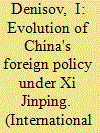

|
|
|
|
|
| Summary/Abstract |
XI JINPING has been more successful than his predecessor, Hu Jintao, in consolidating China's system of government. The domestic political agenda of the "Xi-Li rule" (Li Keqiang is prime minister and an ideologue of the "fifth generation") with the institutions and mechanisms that it has brought into being has taken even less time to put together than observers generally expected. This is the result of Xi's style of governance and new and more difficult challenges that have needed prompt reactions, chiefly internal Communist Party issues that had obviously been the new leader's priorities until mid-2013 or even later.
|
|
|
|
|
|
|
|
|
|
|
|
|
|
|
|
| 8 |
ID:
140587
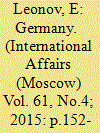

|
|
|
|
|
| Summary/Abstract |
IT WAS NEARLY SEVENTY YEARS ago that the process of postwar settlement was completed in Europe which turned defeated Germany into a "political dwarf." Having spent these seven decades to become Europe's strongest socially-oriented market economy and a donor for its "small states," as well as Europe's main integration force, Germany can hardly claim the key role in international relations. It has no independent foreign policy course, the fact reconfirmed by its position on the Ukrainian crisis manufactured by the United States.
|
|
|
|
|
|
|
|
|
|
|
|
|
|
|
|
| 9 |
ID:
140572


|
|
|
|
|
| Summary/Abstract |
During that war, there existed the so-called Goebbels propaganda, which was named after one of the top figures in Nazism and one of Hitler's fellow genocide mongers, Reich Minister of Public Enlightenment and Propaganda Joseph Goebbels, who met a sticky end in 1945. Goebbels shamelessly used his boss' principle, "The bigger the lie, the more it will be believed." Today, this principle is followed by those who feel that recognizing the victory of the Soviet Union runs against their interests. And it is not only, and not even mainly, ideology or the former confrontation between the two systems that is behind this. The bottom line is a campaign against Russia as a state.
|
|
|
|
|
|
|
|
|
|
|
|
|
|
|
|
| 10 |
ID:
140568


|
|
|
|
|
| Summary/Abstract |
Speaking at a meeting of the Pobeda (Victory) Organizing Committee on March 17, Russian President Vladimir Putin said that May 9 is a day of glory, a day of pride for our people, and a day of the utmost respect for the generation of victors. Our country played a key role in smashing Hitler's war machine and freeing Europe and the world from the madness of Nazism. It was due to the courage, heroism and self-sacrifice of Soviet soldiers and all the peoples of the former Soviet Union, who bore the brunt of the war, that Europe was able to embark on the path of constructive development and partnership. To us, the Great Victory will forever remain a source of national pride and a foundation for bringing up the new generation in the spirit of patriotism. We are all deeply indebted to the veterans. We bow to you.
|
|
|
|
|
|
|
|
|
|
|
|
|
|
|
|
| 11 |
ID:
140573


|
|
|
|
|
| Summary/Abstract |
DISINTEGRATION of the Soviet Union in 1991 started an unbridled campaign of mudslinging of the Soviet period in the history of the state and the nation. The media of Russia and the CIS competed in slandering the Soviet Armed Forces and the officer corps.
|
|
|
|
|
|
|
|
|
|
|
|
|
|
|
|
| 12 |
ID:
140589
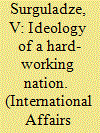

|
|
|
|
|
| Summary/Abstract |
THE GLOBAL ATTENTION to the reforms of the architect of Singapore's "economic miracle" is easily explained by the country's socio-economic successes. Lee Kuan Yew, the first prime minister of Singapore, is an iconic figure in the modern world. In many developing and industrial countries, he is regarded as a true economic and political guru. His book, From Third World to First. The Singapore Story: 1965-2000,1 has deservedly become a handbook for many state leaders.* What kind of a country is Singapore today and why does the experience of this small nation attract the attention of state leaders faced with questions of modernization and successful competition in the global market?
|
|
|
|
|
|
|
|
|
|
|
|
|
|
|
|
| 13 |
ID:
140586


|
|
|
|
|
| Summary/Abstract |
INFORMATION has always played a key role in the life of people, society and the state. From ancient times, the powers that be realized that the possession of information gives an advantage over others, helps achieve a victory, enforce subjugation, and control everything. Today, only he who creates and controls information flows has real power.
|
|
|
|
|
|
|
|
|
|
|
|
|
|
|
|
| 14 |
ID:
140590
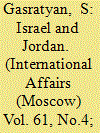

|
|
|
|
|
| Summary/Abstract |
THEIR RELATIONSHIPS have been and remain very special. Jordan has never left its anti-Zionist course but was invariably guided by practical considerations: Israel's geographic proximity, the pro-Western orientation of King Hussein and very modest territorial aspirations. The state of war between them which had begun in 1948 ended much later with a peace treaty of July 25, 1994.
|
|
|
|
|
|
|
|
|
|
|
|
|
|
|
|
| 15 |
ID:
140585
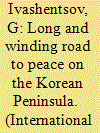

|
|
|
|
|
| Summary/Abstract |
SIXTY-FIVE YEARS AGO, on June 25, 1950, the first salvoes of the Korean War were fired - a war that lasted for over three years and has become one of the most bloody and devastating military conflicts of the latter half of the twentieth century. Its disastrous effects are still being felt today.
|
|
|
|
|
|
|
|
|
|
|
|
|
|
|
|
| 16 |
ID:
140595


|
|
|
|
|
| Summary/Abstract |
RUSSIAN-TURKISH diplomatic relations marked their 95th anniversary on June 3, 2015. Russia and Turkey, each of which is situated partially in Europe and partially in Asia and possesses a rich cultural and historical heritage, are, in a sense, bridges between East and West.
|
|
|
|
|
|
|
|
|
|
|
|
|
|
|
|
| 17 |
ID:
140598
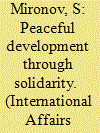

|
|
|
|
|
| Summary/Abstract |
THE 70TH ANNIVERSARY of the Victory over Nazism in the Great Patriotic War and World War II, which we celebrated this year, is the most important event for the entire international community. The titanic efforts of the Red Army and the Soviet people and the military victories of the allied forces saved the world from the Nazi plague and ensured firm guarantees of stable democratic development for the majority of modern states.
|
|
|
|
|
|
|
|
|
|
|
|
|
|
|
|
| 18 |
ID:
140579


|
|
|
|
|
| Summary/Abstract |
IN RECENT DECADES, globalization processes have affected many spheres of human activity, including the nuclear sphere. Under the impact of globalization, the previously divided world, with nuclear weapons and nuclear technology, has transformed and turned into a global system of nuclear dependent states and non-state entities, with systemic properties such as the stability of international nuclear relations, resistance to the impact of destructive factors, nuclear security, and the solidarity of states in addressing global and regional nuclear problems. This global sociopolitical system is known as the "nuclear world."
|
|
|
|
|
|
|
|
|
|
|
|
|
|
|
|
| 19 |
ID:
140581
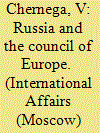

|
|
|
|
|
| Summary/Abstract |
Russian media have paid quite a lot of attention to the April 2014 resolution of the Parliamentary Assembly of the Council of Europe (PACE) that deprived the Russian delegation of its right to vote, a move that, in effect, was upheld by PACE in January 2015.
|
|
|
|
|
|
|
|
|
|
|
|
|
|
|
|
| 20 |
ID:
140588


|
|
|
|
|
| Summary/Abstract |
INTERNATIONAL TRADE has been marked by dramatic dynamics in the years after the global financial crisis of 2008-2009. The 23% plunge in global exports - in monetary terms - was followed by a nearly "mirror-like" increase in 2010 and 2011, by 22% and 20% respectively. However, in 2012, international trade stagnated, showing effectively zero growth, and 2013 saw a mere 2% increase.
|
|
|
|
|
|
|
|
|
|
|
|
|
|
|
|
|
|
|
|
|